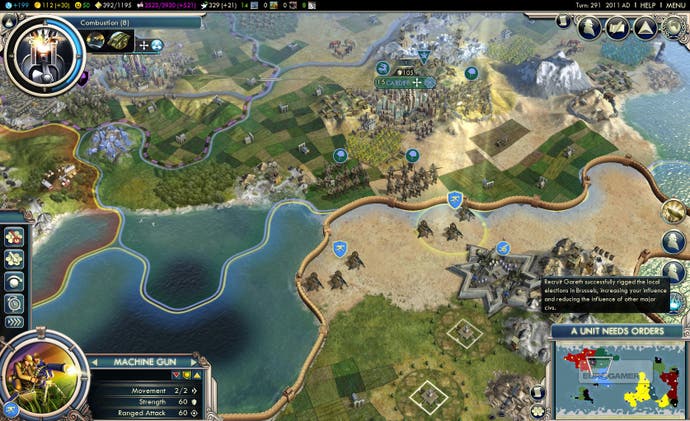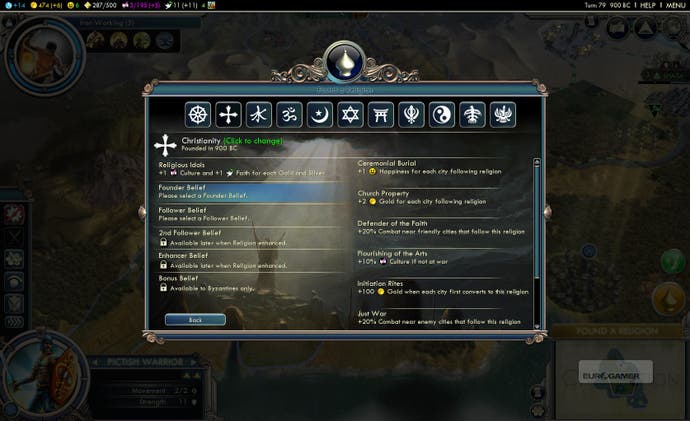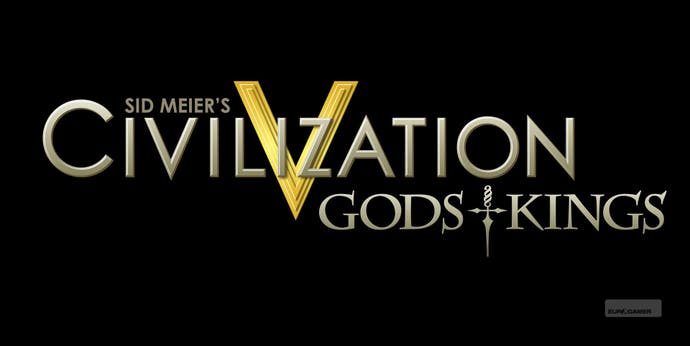Civilization 5: Gods and Kings Preview: Restoring the Faith
Firaxis' expansion reintroduces some of the series' complexity.
By the time Firaxis had pumped out Civ 4's second expansion, Beyond the Sword, the legendary history-builder was as tight, wide-ranging and complex as it had ever been. No small world wonder, then, that when a trendy, slim-line Civilization 5 scooted in on a pair of wheelies and did a 'Fonzie-point' with thumb and forefinger towards newer players some Civ acolytes elected to stay behind.
For many, systems like Religion and Espionage had become part of the bedrock, as integral to Civ as the desire to crush those bastard Romans. It was seemingly impossible for some to go without the complexity, hexagons or no. With Gods and Kings, then, Firaxis aims to let Civ 5 emit enough cultural significance to retake the allegiance of the players who currently sit beyond its borders.
First on the agenda, then, is the reintroduction of religion. Could this be the point that we can answer the enduring question of 'Which religion is best?' without resorting to the 'Well, my one, obviously' default?
"I don't want that question weighing on my shoulders!" laughs Lead Designer Ed Beach. "It's better to put it on the players. They have to wade through all the beliefs that we're giving them, and try to decide what they need. Say they've got an aggressive leader like Genghis Khan or Napoleon next to them. Do they want to worship a goddess of protection? Or are they in an isolated island kingdom, would it be wise to worship the God of the Sea for bountiful harvests? You look at your situation, you look at what Civilizations you're playing and which victory style you're going for - if you then build all that into your religion then you're good."

Civilization 4's religion was a good system in terms of its spread and the allegiances it formed, but there was little player agency. Apropos of nothing you'd hear word that the Romans had discovered Buddhism, and you'd later see them running around sticking swords into Mayan followers of Judaism. It added flavour to the game, but also could feel like something of a random factor.
The new system is based on Faith - a value you earn at first through discovering ancient ruins, constructing holy buildings or pandering to the eccentricities of your chosen Civ. Pictish warriors, for example earn Faith through victory in combat - while the whimsical Celts see their faithometer rise through proximity to the faerie-folk of the forests.
Once your Faith reservoir is full enough, you'll then create the Pantheon of the Gods - which is your first opportunity to officially establish your religion, and indeed lock it off from opposing Civilizations. Although it'll likely revolve around the terrain you started your game within every city you later found will bear its mark - and in turn start riling the local infidels left, right and centre.
The real fun begins, however, when your Faith flow earns you a Great Prophet. They'll let you customise your religion to keep it more in keeping with contemporary times (no mention of a gay marriage toggle as yet) and to help propel your way of thinking further across the globe.
When a city has a majority of religious types within its walls then they can stare accusingly across a whole ten tiles, draining the willpower of neighbouring heathens. If more direct action is needed, meanwhile, missionaries can head off to do some haps and claps to impress foreign-types - while internally Inquisitors can be enlisted to punish those who do not expect them. (Everyone.)

Next up for a heavy update, and also drawn a little closer to the way history has handled the subject matter, are spy games. "Espionage is giving you a deeper look into the game world, and telling you a lot more about what's going on with the other Civilizations." Explains Beach, before launching into a system that provides for far more than a giggling character dashing away from the Aztec capital with Nationalism clasped under his arm.
In fact, espionage now operates from its own separate screen - from which you can act all 'M' and ask your spies stuff like 'How much do you know about the Great Wall of China?' This is your window to goings-on elsewhere in the world, looking in on the rival Civ movements that could formerly only be guessed at when you saw enemy triremes flitting around the furthest reaches of your map. Your embedded spies leech information from your chosen target's AI machinations, letting you see glimpses of who's sending troops where and what's been left unguarded. It's an enticing system, if one that's understandably been snipped from multiplayer.
The espionage system also lets you toy with city states, letting you rig elections and organise coups. Success will result in a power that suddenly thinks you're the bee's knees, failure will result in the consensus being that you're a gerrymandering git.
If you want to do the decent thing and befriend a city state, meanwhile, then it'll take a lot more than the cold hard cash that was generally required in Civ 5. Depending on their outlook (city states can now be religious or mercantile, as well as their usual vanilla flavour) each will have a checklist of tasks they'd like you to perform. They're more fussy about choosing a mate now, essentially, so you'll have to work hard to charm them. Or, if you think it easier, you can still just send the tanks in...

What would a Civ expansion be, meanwhile, if it weren't for a fresh bunch of historical celebrities drafted in to represent their personal band of warmongers? Dido of the Carthaginians, Pacal the Great of the Mayans, Boudicca of the Celts and William of Orange of the Dutch will all make their presence felt - the latter with a full range of dykes, windmills and tulip fields.
Hot on the tweak-list too, is combat. The primary change here is that Firaxis has slowed down warring to allow for a little more texture and tactical thought. While units duke it out you'll have extra time reshuffle the ranks, draw in reinforcements and draw up your line - so confrontations that whistled past in Civ 5 will now be more dramatic affairs. The unit roster, meanwhile, has been widened to include mechanical starlets from World War One. Naval combat, too, has been given teeth beyond ranged bombardment through bitey melee ships that can knock holes in enemy armadas, and even capture coastal cities under their own steam and sail.
So once this expansion becomes a reality, might Firaxis be crowned once more as king by hardcore fans? Or better than kings, Gods? Well, quite possibly.
Gods and Kings fleshes out religion and espionage above and beyond what we once saw in Civilization 4 - piling on a massive slab of player agency with systems that make genuine historical sense. More importantly, once they're implemented the lush hexagonal fields of Civilization 5 will feel that little bit more complete. Your game won't just be about crushing those bastard Romans now, but everything that they believe in too...

